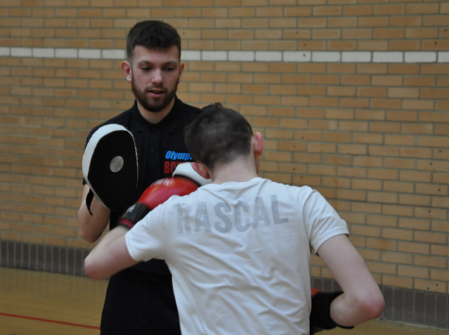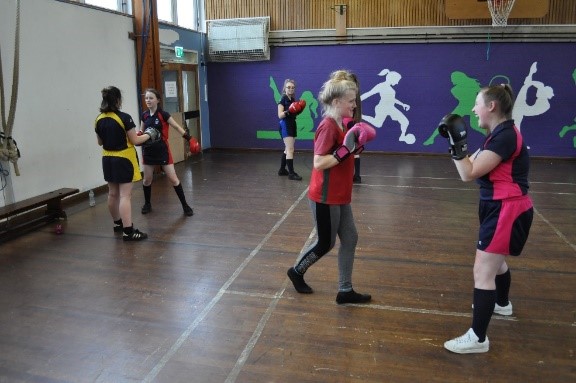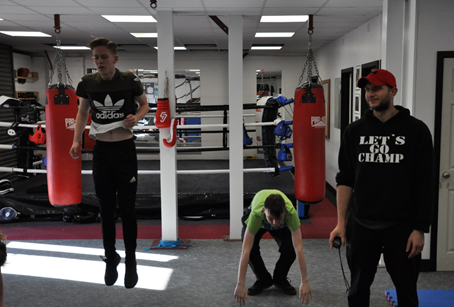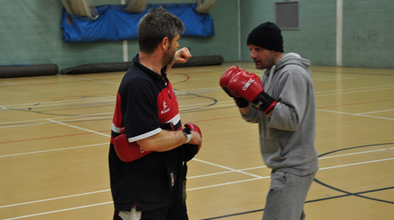Activity Type
Boxing & Boxercise
Audience
14-19 years, many with special educational and/or physical needs
Location
Kent & Medway
Funding Value
£43,840
Partners
Secondary schools, youth clubs & boxing clubs

What Kent Sport were trying to achieve
Kent Sport identified Boxing as an activity that ‘less active’ young people would like to try so worked with local partners to provide more opportunities by developing Boxing Satellite Clubs.

The project in numbers
Over the last two years, 996 participants have engaged in 28 boxing satellite clubs (including seven boxing clubs, 16 schools, six youth clubs, two pupil referral units and one college).

Impact of the funding
After attending the satellite club sessions, all the surveyed participants have stated they now take part in physical activity for over 60 minutes per week (excluding school PE lessons).

Sustainability
£3,000 of investment has been allocated across these clubs to deliver professional training courses, which staff and young leaders from host sites can attend to allow for more future sessions.
Kent Sport commissioned Canterbury Christ Church University’s Sport, Physical Education & Activity Research team (SPEAR) to produce a Kent Insight Report. This was designed to gain a deeper understanding of youth participation in sport and physical activity across Kent and Medway. SPEAR’s insight report focused on the perceptions, attitudes, behaviours, motivations and barriers to sport and physical activity participation in inactive/irregularly active young people. Kent Sport found that one of the top 10 activities that both young males and females voted for was boxing/boxercise. The findings were promoted across the county and have since received considerable interest from key stakeholders to develop satellite club sessions in the sport.
Our ‘Towards an Active County’ strategy and Satellite Clubs programme have both highlighted priority areas in Kent; Folkestone & Hythe, Medway, Swale and Thanet, so we primarily looked to develop boxing sessions within these districts, in order to target the children and young people from these most deprived and inactive areas of the county. All our satellite clubs target children and young people who are irregularly active and from underrepresented groups. Lead Organisations are expected to target these groups within our Satellite Club approval process, along with the requirement to utilise Sport England and/or Kent Sport’s youth insight to design and deliver the sessions.
Using our findings and partner’s resources, we devised an ‘Identifying the Right Person to Deliver Your Sessions’ advert which indicated the type of coach who would be more likely to engage children and young people. Following this approach, we identified deliverers and venues across the county to meet the demand and deployed qualified coaches from Olympia Boxing CIC, Canterbury City Boxing and Jade Bailey Aerobics across ten different venues.
Olympia Boxing CIC, who employ coaches from various clubs across the county to deliver community-based programmes and have been a key partner to link satellite club participants with their local boxing clubs. We had already successfully worked with the organisation in previous years and in other projects, and they went on to win our Kudos Award 2018 for their work with children and young people. We also partnered with Canterbury City Boxing Club and Jade Bailey Aerobics (Thanet), who have also run satellite clubs over the last year in boxing and boxercise respectively.
Since March 2019, we surveyed 58 young people attending seven of these satellite clubs to explore the impacts of both the sessions and our approach. From these survey responses, we found that as a result of the sessions: 63% stated that they felt happier; 67% felt fitter and healthier; and 63% said it had made them feel more confident. This shows that the individual development of the participants has been very positive due to attending the weekly boxing clubs. When asked motivations to begin coming to the sessions, 87% of participants surveyed stated that being physically active helps to keep them calm and focused. This shows that they recognised there was a need to improve their behaviour beforehand, and we believed that setting up boxing clubs was an effective way to support these young people to achieve their personal goals.
To ensure that the activities being delivered were contributing to Chief Medical Officer guidelines, we assessed if the sessions were ‘moderate to vigorous intensity physical activity’, and how this has impacted their extra-curricular activity levels. The results of this are shown below:
|
How much physical activity were you |
Before |
After |
|
0 mins-30 mins/week |
14 |
0 |
|
Average of 60 mins/week |
12 |
28 |
|
More than 60 mins per day every day |
15 |
17 |
In addition, 91% felt out of breath, warmer and that their heart was beating faster during the sessions.
|
Does the club make you feel out of |
Total |
% |
|
Yes |
52 |
91 |
|
No |
5 |
9 |
(NB: one participant did not answer this question)
One of our secondary schools who have been particularly supportive in our focus of getting young people more active is Saint George’s School in Gravesend, and Mr Gavin Bright, Head of Physical Education, pointed out that:
Most of these pupils (attending the satellite club) are not the most active or sporty, but they’ve really become engrossed in the boxing club sessions.
The impacts have also been evident in a selection of quotes from the young people taking part in these sessions across the county:
“It has helped a lot with controlling my anger, and Tommy (the coach) is a great instructor, he makes it really fun.”
“This club is an amazing place to be in a really friendly environment. Everyone gets along and I look forward to it every Friday. We learn a lot.”
“It has helped me be more confident in myself.”
“This is very different from what I am used to, but from what I have experienced so far it is very fun and challenging.”
The number of new participants attending these Boxing sessions alone, have justified our longer-term approach to develop county specific research into our target audiences. We now ask all stakeholders and our team of local Club Link Makers to ensure they consult with young people on how they would like the session to be delivered and the activities involved when developing new satellite clubs.
Some of the satellite club sessions took place at the hub clubs, and Kent Sport asked participants to provide a score from 1-10, on how likely they are to join community boxing clubs outside of these sessions (with 10 being most likely). The most common answer was “10”, stated by over 40% of the participants, and some of these individuals have already begun taking part at their local boxing clubs. This suggests that the visits to the hub club have made a large impact and is something we will continue to advocate through our guidance when developing satellites in other sports. Although we have learnt that some participants prefer to remain in the satellite club, referring participants to local boxing clubs will also help with sustainability, and will lead to increased long-term participation.
We have also seen that Boxing or similar activities, are an effective way to engage young people experiencing mental health and behavioural challenges, which are becoming more apparent in many young people in deprived areas of the county. Even more pertinent learning for us and the young people, is that they were feeling happier in their day to day lives, which reinforces the positive impacts physical activity has on mental as well as physical wellbeing.
As described above, this approach has further confirmed the need to ensure young people are at the heart of planning and delivery of satellite clubs. Going forward, we plan to embed this in our delivery by asking project leads to indicate the numbers who have vocalised input to design and delivery of Satellite Clubs.
In terms of the Boxing Satellite Clubs, £3,000 of investment was allocated across these clubs to deliver training such as the Box Fit Instructor Course, which staff and young leaders from the host sites attended to allow for more sessions to be delivered throughout the week. We felt this was important, not only to make sessions sustainable, but also for young people to meet their 60 minutes of physical activity every day, rather than only when the club coach was on site.
We are regularly being contacted about developing new Boxing Satellite Clubs, particularly amongst our colleagues in youth and health services. As a result of this growing demand, we have supported Olympia Boxing to develop more coaches through our mentor support programme, which will provide more young people with fun and enjoyable opportunities to be physically active.
